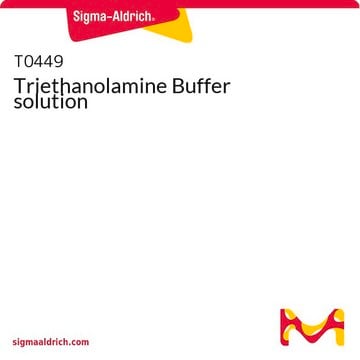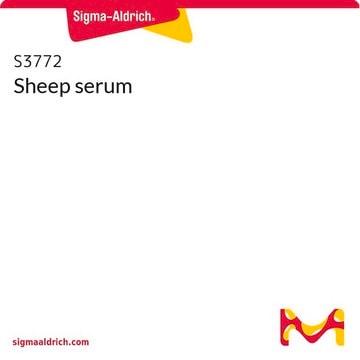T1502
Triethanolamine hydrochloride
≥99.5% (titration)
Synonym(s):
2,2′,2′′-Nitrilotriethanol hydrochloride, Tris(2-hydroxyethyl)amine hydrochloride
About This Item
Recommended Products
Assay
≥99.5% (titration)
form
crystalline powder
useful pH range
7.3-8.3
pKa (25 °C)
7.8
mp
177-179 °C (lit.)
solubility
water: 0.333 g/mL, clear, colorless
application(s)
diagnostic assay manufacturing
SMILES string
Cl.OCCN(CCO)CCO
InChI
1S/C6H15NO3.ClH/c8-4-1-7(2-5-9)3-6-10;/h8-10H,1-6H2;1H
InChI key
HHLJUSLZGFYWKW-UHFFFAOYSA-N
Looking for similar products? Visit Product Comparison Guide
General description
Application
- in the preparation of triethanolamine buffer
- in rinsing the digested sections, prepared for in situ hybridization
- as a component of solution A to prepare TA-complement haemolysis buffer (TA-CHB)
Biochem/physiol Actions
Storage Class Code
11 - Combustible Solids
WGK
WGK 1
Flash Point(F)
Not applicable
Flash Point(C)
Not applicable
Personal Protective Equipment
Certificates of Analysis (COA)
Search for Certificates of Analysis (COA) by entering the products Lot/Batch Number. Lot and Batch Numbers can be found on a product’s label following the words ‘Lot’ or ‘Batch’.
Already Own This Product?
Find documentation for the products that you have recently purchased in the Document Library.
Customers Also Viewed
Protocols
Objective: To standardize a procedure for the enzymatic assay of Aprotinin.
Measure hexokinase activity using a continuous spectrophotometric rate-determination assay at 340 nm, catalyzing D-hexose sugar phosphorylation using ATP.
Measure hexokinase activity using a continuous spectrophotometric rate-determination assay at 340 nm, catalyzing D-hexose sugar phosphorylation using ATP.
Measure hexokinase activity using a continuous spectrophotometric rate-determination assay at 340 nm, catalyzing D-hexose sugar phosphorylation using ATP.
Our team of scientists has experience in all areas of research including Life Science, Material Science, Chemical Synthesis, Chromatography, Analytical and many others.
Contact Technical Service










